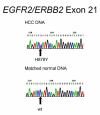A novel mutation in the tyrosine kinase domain of ERBB2 in hepatocellular carcinoma
- PMID: 17150109
- PMCID: PMC1712353
- DOI: 10.1186/1471-2407-6-278
A novel mutation in the tyrosine kinase domain of ERBB2 in hepatocellular carcinoma
Abstract
Background: Several studies showed that gain-of-function somatic mutations affecting the catalytic domain of EGFR in non-small cell lung carcinomas were associated with response to gefitinib and erlotinib, both EGFR-tyrosine kinase inhibitors. In addition, 4% of non-small cell lung carcinomas were shown to have ERBB2 mutations in the kinase domain. In our study, we sought to determine if similar respective gain-of-function EGFR and ERBB2 mutations were present in hepatoma and/or biliary cancers.
Methods: We extracted genomic DNA from 40 hepatoma (18) and biliary cancers (22) samples, and 44 adenocarcinomas of the lung, this latter as a positive control for mutation detection. We subjected those samples to PCR-based semi-automated double stranded nucleotide sequencing targeting exons 18-21 of EGFR and ERBB2. All samples were tested against matched normal DNA.
Results: We found 11% of hepatoma, but no biliary cancers, harbored a novel ERBB2 H878Y mutation in the activating domain.
Conclusion: These newly described mutations may play a role in predicting response to EGFR-targeted therapy in hepatoma and their role should be explored in prospective studies.
Figures
Similar articles
-
EGFR, ERBB2, and KRAS mutations in Korean non-small cell lung cancer patients.Cancer Genet Cytogenet. 2007 Mar;173(2):107-13. doi: 10.1016/j.cancergencyto.2006.10.007. Cancer Genet Cytogenet. 2007. PMID: 17321325
-
Somatic mutations of ERBB2 kinase domain in gastric, colorectal, and breast carcinomas.Clin Cancer Res. 2006 Jan 1;12(1):57-61. doi: 10.1158/1078-0432.CCR-05-0976. Clin Cancer Res. 2006. PMID: 16397024
-
ERBB2 kinase domain mutation in the lung squamous cell carcinoma.Cancer Lett. 2006 Jun 8;237(1):89-94. doi: 10.1016/j.canlet.2005.05.026. Epub 2005 Jul 18. Cancer Lett. 2006. PMID: 16029927
-
Tyrosine kinase inhibitors for non-small-cell lung cancer: finding patients who will be responsive.Expert Rev Respir Med. 2011 Jun;5(3):413-24. doi: 10.1586/ers.11.27. Expert Rev Respir Med. 2011. PMID: 21702662 Review.
-
An update of the mechanisms of resistance to EGFR-tyrosine kinase inhibitors in breast cancer: Gefitinib (Iressa) -induced changes in the expression and nucleo-cytoplasmic trafficking of HER-ligands (Review).Int J Mol Med. 2007 Jul;20(1):3-10. Int J Mol Med. 2007. PMID: 17549382 Review.
Cited by
-
Mechanisms and therapeutic targets of ErbB family receptors in hepatocellular carcinoma: a narrative review.Transl Cancer Res. 2024 Jun 30;13(6):3156-3178. doi: 10.21037/tcr-24-837. Epub 2024 Jun 27. Transl Cancer Res. 2024. PMID: 38988928 Free PMC article. Review.
-
Activating HER2 mutations as emerging targets in multiple solid cancers.ESMO Open. 2017 Nov 24;2(5):e000279. doi: 10.1136/esmoopen-2017-000279. eCollection 2017. ESMO Open. 2017. PMID: 29209536 Free PMC article. Review.
-
EGFR Signaling in Liver Diseases.Int J Mol Sci. 2015 Dec 29;17(1):30. doi: 10.3390/ijms17010030. Int J Mol Sci. 2015. PMID: 26729094 Free PMC article. Review.
-
Chromogenic in situ hybridization analysis of Epidermal Growth Factor Receptor gene/chromosome 7 numerical aberrations in hepatocellular carcinoma based on tissue microarrays.Pathol Oncol Res. 2009 Sep;15(3):511-20. doi: 10.1007/s12253-008-9146-5. Pathol Oncol Res. 2009. PMID: 19145479
-
Analysis of different HER-2 mutations in breast cancer progression and drug resistance.J Cell Mol Med. 2015 Dec;19(12):2691-701. doi: 10.1111/jcmm.12662. Epub 2015 Aug 25. J Cell Mol Med. 2015. PMID: 26305917 Free PMC article. Review.
References
-
- Lillemoe KD. Cancers of the Biliary Tree: Clinical Management. In: Kelsen KP, Daly JM, Kern SE, Levin B, Tepper JE, editor. Gastrointestinal Oncology, Principles and Practice. 1. Philadelphia. Lippincott Willaims and Wilkins; 2002. pp. 645–662.
-
- Lynch TJ, Bell DW, Sordella R, Gurubhagavatula S, Okimoto RA, Brannigan BW, Harris PL, Haserlat SM, Supko JG, Haluska FG, Louis DN, Christiani DC, Settleman J, Haber DA. Activating mutations in the epidermal growth factor receptor underlying responsiveness of non-small-cell lung cancer to gefitinib. N Engl J Med. 350:2129–39. doi: 10.1056/NEJMoa040938. 2004 May 20. - DOI - PubMed
-
- Paez JG, Janne PA, Lee JC, Tracy S, Greulich H, Gabriel S, Herman P, Kaye FJ, Lindeman N, Boggon TJ, Naoki K, Sasaki H, Fujii Y, Eck MJ, Sellers WR, Johnson BE, Meyerson M. EGFR mutations in lung cancer: correlation with clinical response to gefitinib therapy. Science. 304:1497–500. doi: 10.1126/science.1099314. 2004 Jun 4. - DOI - PubMed
-
- Pao W, Miller V, Zakowski M, Doherty J, Politi K, Sarkaria I, Singh B, Heelan R, Rusch V, Fulton L, Mardis E, Kupfer D, Wilson R, Kris M, Varmus H. EGF receptor gene mutations are common in lung cancers from "never smokers" and are associated with sensitivity of tumors to gefitinib and erlotinib. Proc Natl Acad Sci USA. 101:13306–11. doi: 10.1073/pnas.0405220101. 2004 Sep 7. - DOI - PMC - PubMed
Publication types
MeSH terms
Substances
LinkOut - more resources
Full Text Sources
Medical
Research Materials
Miscellaneous


